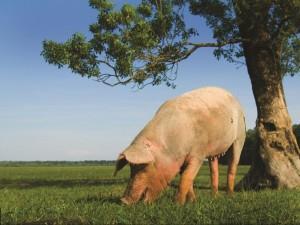Pig producers can reduce their antibiotic usage by taking lessons learned from the poultry industry, poultry veterinary practice St David’s Poultry Team has said.

According to the veterinary practice the answer is to boost and protect the animals’ natural bacteria and health, therefore removing the necessity for routine antibiotic use.
St David’s Poultry Team partner, Richard Turner, commented: “It’s easy to assume that pigs and poultry don’t have much in common, but in practice there are huge similarities. All animals are made up of 90% bacteria and only 10% their own cells, and that provides the clue to keeping healthy – nurture those ‘good’ bacteria and they will protect against the pathogenic organisms which make us ill.
“The effect of weaning and a change in diet adversely affects the piglets’ gut, leading to a 25% drop in villi length. This damages the gut flora, potentially resulting in gastric ulcers and slow growth rates. Treatment with antibiotics is a routine prevention at this time, but this kills off many of the beneficial bacteria, resulting in a dysfunctional gut and impacting productivity,” Turner said.
“Antibiotic resistance is a huge threat to human health, and livestock farmers are under increasing pressure to stop using antibiotics altogether. By improving the animals’ natural health through a combination of probiotics, organic acids and water sanitation, we have been able to cut poultry farmers’ antibiotic usage considerably. More than 40% of medicines we now use to treat infections are not antibiotics."
This story was originally published on a previous version of the Meat Management website and so there may be some missing images and formatting issues.















